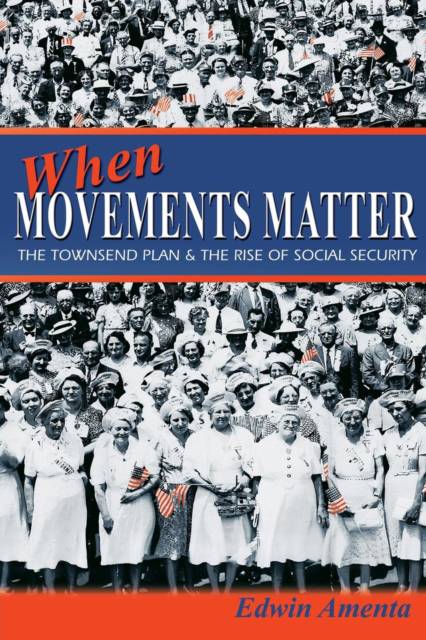
Door een staking bij bpost kan je online bestelling op dit moment iets langer onderweg zijn dan voorzien. Dringend iets nodig? Onze winkels ontvangen jou met open armen!
- Afhalen na 1 uur in een winkel met voorraad
- Gratis thuislevering in België vanaf € 30
- Ruim aanbod met 7 miljoen producten
Door een staking bij bpost kan je online bestelling op dit moment iets langer onderweg zijn dan voorzien. Dringend iets nodig? Onze winkels ontvangen jou met open armen!
- Afhalen na 1 uur in een winkel met voorraad
- Gratis thuislevering in België vanaf € 30
- Ruim aanbod met 7 miljoen producten
Zoeken
€ 59,95
+ 119 punten
Omschrijving
When Movements Matter accounts for the origins of Social Security as we know it. The book tells the overlooked story of the Townsend Plan--a political organization that sought to alleviate poverty and end the Great Depression through a government-provided retirement stipend of $200 a month for every American over the age of sixty.
Both the Townsend Plan, which organized two million older Americans into Townsend clubs, and the wider pension movement failed to win the generous and universal senior citizens' pensions their advocates demanded. But the movement provided the political impetus behind old-age policy in its formative years and pushed America down the track of creating an old-age welfare state. Drawing on a wealth of primary evidence, historical detail, and arresting images, Edwin Amenta traces the ups and downs of the Townsend Plan and its elderly leader Dr. Francis E. Townsend in the struggle to remake old age. In the process, Amenta advances a new theory of when social movements are influential. The book challenges the conventional wisdom that U.S. old-age policy was a result mainly of the Depression or farsighted bureaucrats. It also debunks the current view that America immediately embraced Social Security when it was adopted in 1935. And it sheds new light on how social movements that fail to achieve their primary goals can still influence social policy and the way people relate to politics.Specificaties
Betrokkenen
- Auteur(s):
- Uitgeverij:
Inhoud
- Aantal bladzijden:
- 352
- Taal:
- Engels
- Reeks:
Eigenschappen
- Productcode (EAN):
- 9780691138268
- Verschijningsdatum:
- 21/07/2008
- Uitvoering:
- Paperback
- Formaat:
- Trade paperback (VS)
- Afmetingen:
- 152 mm x 229 mm
- Gewicht:
- 453 g

Alleen bij Standaard Boekhandel
+ 119 punten op je klantenkaart van Standaard Boekhandel
Beoordelingen
We publiceren alleen reviews die voldoen aan de voorwaarden voor reviews. Bekijk onze voorwaarden voor reviews.











